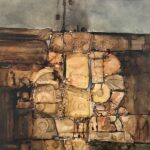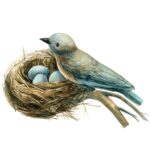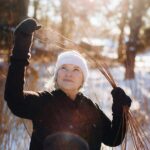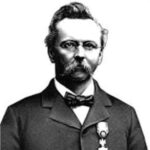

Justin Rutledge looks out at the approaching ferry that bridges the Adolphus Reach and Glenora across the Bay of Quinte – a narrow stretch of blue, less than a mile wide, separating Prince Edward County from the mainland. “There’s a picture of my mom holding me on this ferry at six months old,” he says, gazing out at the relatively unchanged scene. “I spent all my summers here, about 16 years, at a little campground about four minutes down the road.” Justin gestures across the water and slightly east. “Every day, we’d read books and roast marshmallows, then cross the ferry and go to Sandbanks.” He smiles at me and confesses, “Once, as a young teen I even biked into town for cigarettes, but no one would sell them to me.” We laugh together and naturally move away from the barrier wing as the passenger boat reaches the dock, allowing this age-old crossing ritual to continue, unhindered by the two of us.
My country’s cold in autumn’s chains Every time I think of her it rains When she breathes upon the morning She shakes all the weather vanes – Alberta Breeze
It was 2017. I’d recently moved to the County and was still persistently awestruck at the staggering talent of the folks who crossed these bridges to live here. Leaning into the Wellington and Hillier crowds where much of the County action seemed to be at the time, a group had gathered to listen to local guitar slingers, Norris & Jones, do their beautiful acoustic thing. They launched into a cover of “A Penny For The Band” – the third track on Justin Rutledge’s third album Man Descending (named for Canadian writer Guy Vanderhaeghe’s collection of short stories with the same title) – and I became a Justin Rutledge fan.
“I’ve known Stew Jones a long time,” Justin tells me when I ask if it’s weird that I began following his music after hearing Norris & Jones do the song. “He painted the cover for my 2010 album The Early Widows. Stew’s always been a big supporter of Canadian music and I’ve long admired his artwork. I got to know Trevor Norris through Stew and was flattered to hear that they included my song in their sets – I’ve seen them play dozens of times over the years.”
Late September There’s a man standing on a bridge A river is chosen The west wind blows in – Mrs. Montgomery
In late August of this year, we went to watch Justin perform at the final instalment of “The Poolside Sessions” – a long running event series at Stew Jones’s Wellington home, each featuring a Canadian singer-songwriter who’d plug in under the stars and deliver an intimate set for a music-serious audience. Stew and his wife Rebecca were moving, so future sessions would be held elsewhere. “It started in the summer of 2013 or ’14,” Stew remembers. “Justin and I were talking a lot at that time and I mentioned that I’d had the idea of holding the ‘studio house sessions’ in the gallery space of our new house in the County. Then he sent me a late night text saying ‘I wanna play your sessions.’ That was it. Wayne Petti and Matt Barber followed later that summer.” The much-loved series eventually migrated from the studio house to the back yard, and on this last night, the evening was brisk and clear, the moon shone off the pool. The cool air carried Justin’s soft vocals and simple songs farther away from the fairy-lit stage towards the big bonfire set deeper into the property, and the overflow guests gathered there, swaying, warmed by the peripheral proximity to the high flames and the sweet melodies.
“This one’s a Norris & Jones cover,” Justin teased, launching into “Penny” and we all laughed.
With a bottle of Burgundy Where she waits on the balcony With a northern wish and a daisy in her hand To send me all her love and a penny for the band – A Penny for the Band
Justin’s particular brand of Canadian country music that rests on his poetic, folksy, guitar-driven style has earned him the ear of devout fans, international critical praise, and numerous accolades, nominations and awards – among them, a JUNO. His musical career began in the midst of his university one – disrupting, or maybe evolving from, a degree in English Literature with a major in Modern Poetry. “I decided to take a year off to make a record,” Justin explains. “I said ‘I’ll go back to school: I want to make a record I’m happy with and then I’ll finish my degree.’” With that, the former U of T literary journal editor-in-chief left academia to make music that, unshockingly, reads and sounds like poetry.
“Will you go back?” I ask as we watch the throng of local Teslas and trucks disembark from the ferry.
“I haven’t been back yet,” Justin smiles, “but I will.” He bought a home for himself on Wellington Main Street in 2015, built a cabin out back and considered how great it was to live here; but within two years, Justin met the woman he would be with forever – she was beautiful and lovely, a talented designer and television personality. It made sense for the two of them to be in Toronto, so he sold the Wellington place and moved back to the city. “I miss it, but I don’t regret it,” Justin says a little wistfully as we drive by the property. In 2018, the two were married at The Hayloft Dancehall in Cherry Valley, but it wasn’t until five years later that they would officially move back to the County – to Picton – this time with two little boys in tow. The release of Justin’s album Something Easy would mark the move and also the tenth album since his debut in 2004. In contrast to the implications of the album’s name, Justin produced, wrote, recorded and engineered the album alongside his new role as a hands-on dad. “Do you escape?” I ask, trying to remember how I did anything before my beloved boy became school-aged.
“I recorded and released my last album when my kids were really a toddler and a newborn, and it became a fruitful, yet exhausting experience.”
“Mmmmmm,” I think I say out loud – supportively I hope.
“I think I’d like to take the next year or two and give myself over to fatherhood,” he continues. “These early years don’t come around again and I’d like to be as present as possible for my kids and my wife. Music will always be there for me – we’re cool like that.”
“Is it the same with writing?” I wonder, a bit jealously, but keep it to myself.
Seventeen, seven sins Can we just hide here before the war begins? River run, river rage From the beak of a yellow bird beside a cage To a field of broken drums upon a stage – Jack of Diamonds
“Do you think we’ll have a chance to do the interview today?” Justin asks with a smile, clinking his ginger ale to my beer. We’re at Midtown Brewing Company, after a long, multi-location tour around the County to shoot photos for our story. “This is the interview, Justin,” I laugh, seeing the consistent sincerity in his blue eyes shift into slight confusion. Because Justin’s been in and out of the County since we met, we’ve known each other for a while, but our friendship is relatively new and my approach to this article series probably seems weird. “It’s just us, hanging out,” I explain. I don’t want Justin to slip into media mode – I want us to have moments together and space to observe the poetry of the County-side.
“I spent all my summers here at a little campground down the road. Every day, we’d read books and roast marshmallows, then cross the ferry and go to Sandbanks.”
Sure enough, we’re soon standing in the middle of a field of tall grasses and wildflowers near the Millennium Trail, and Justin is strumming something unbelievably pretty that’s not anything in particular on his guitar. The combination of the soft sunlight on my skin and the gentle melody, dipping in and out of the breeze is wildly moving. There is a strong literary undercurrent in Justin’s body of work that I’d guess might earn him an honorary doctorate should he decide to stay by music’s side until the end, but moments like these are convincing fodder – at least for someone like me. His fourth album The Early Widows is lyrically stunning; its story-driven songs beautifully illuminate the human condition, using simple language to build evocative characters, framed against those landscapes that call to our rawest hearts. It’s on this album too, that the stirring and somehow heartbreaking “Be a Man” was co-written with legendary Canadian novelist and poet Michael Ondaatje.
“Why did you get into this?” I ask, wondering about his destiny as a standalone writer.
“Well I picked up the guitar to meet girls,” he smiles, mostly kidding. “Actually, I never set out to write a hit or anything. My whole career is based on songs that come into my head. I’ve been encouraged to co-write and I have a tremendous amount of respect for people who do that, but that never came easily to me – what came easily was saying what I was feeling in a song. I got a lot of commentary from the industry, saying, ‘it’s too personal,’ but I’ve always just sort of stayed true to that.”
Half a mile out, knee deep in Hooked on a dream that is reelin’ me in The water is perfectly still Fall of a thunderbolt waiting Until when the lightning hits the lake You’ll know how it feels to want you and wait – Count Me In
It’s been said that you’re not true-County until you have three generations in the cemetery, but I feel that Justin, though Toronto-born, should be considered an exceptional case given that he’s experienced some of life’s most meaningful markers on Prince Edward County soil. He’s examined this place through the eyes of an infant and as a man; he’s owned land with various and diverse County views – from the west side to the east. It was here that he shared his first kiss; he was married at the local dancehall; built a cabin on his own land; and now, he’s returned to raise his beloved family. To me, this feels like a homecoming.
“I was very close with my grandmother, Mary,” Justin says. “After she passed away when I was in my early twenties, I borrowed a friend’s car and drove to Prince Edward County, crossed the Glenora Ferry, and set up a tent at the campground to be alone with my grief. The County was the place where I wanted to be in that time of crisis and deep loss. Looking back, I feel as though moments like that illustrate the deep connection I felt with the County. I wanted to go somewhere where I felt safe and comforted. I still feel that way.”
“Trust me,” Michael Ondaatje has said, explaining that this should be the first line of every novel, “this will take time but there is order here, very faint, very human. Meander if you want to get to town.” This reads like Justin Rutledge’s story too – meandering towards Prince Edward County since he was a babe in his mother’s arms, the bay breeze tousling his hair as the seeds of the things he would write began to take root in his reaching mind. And, as the story finally gets to town, the reader digs deep, asking herself: what will happen next?
Story by:
Lonelle Selbo
Photography by:
Ian Brown




